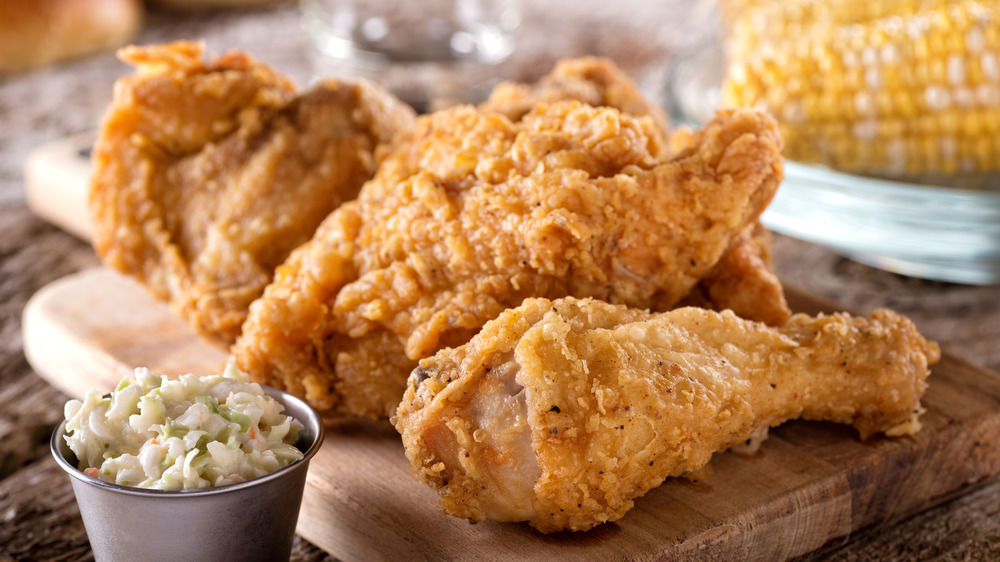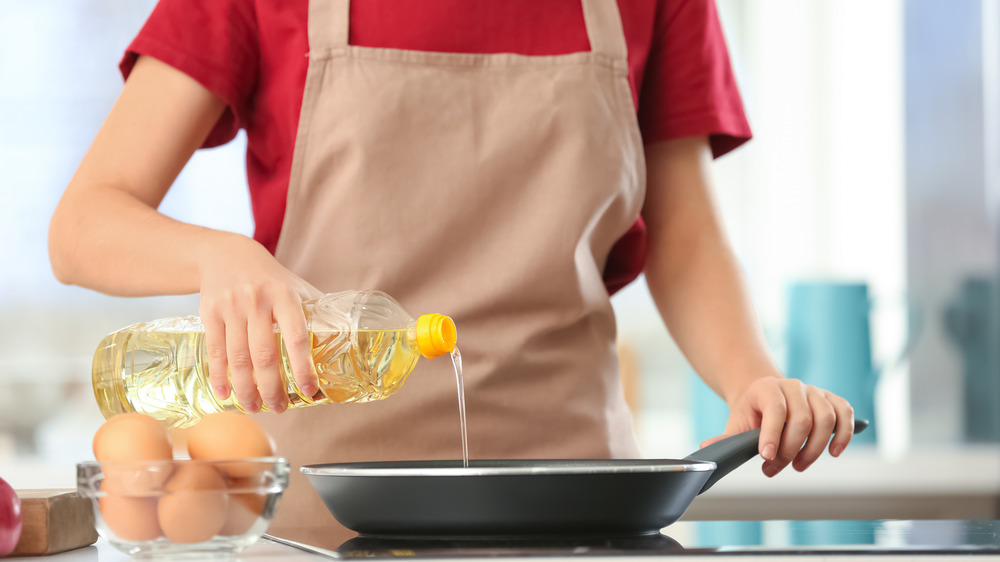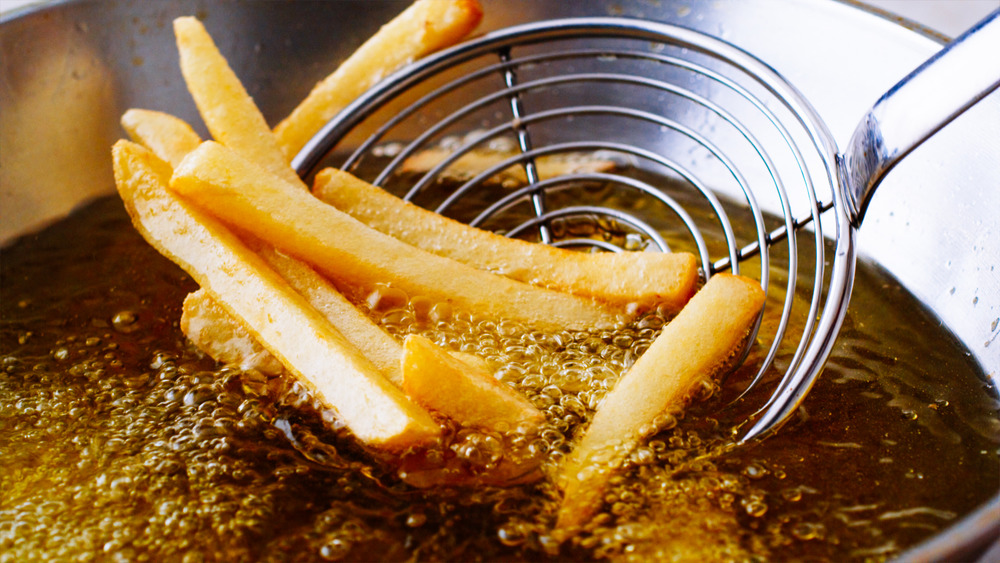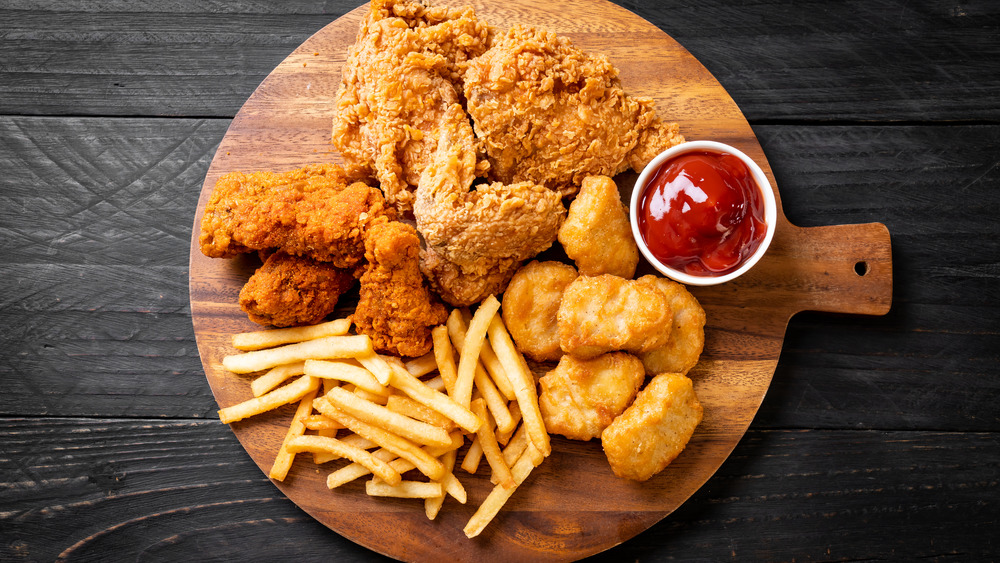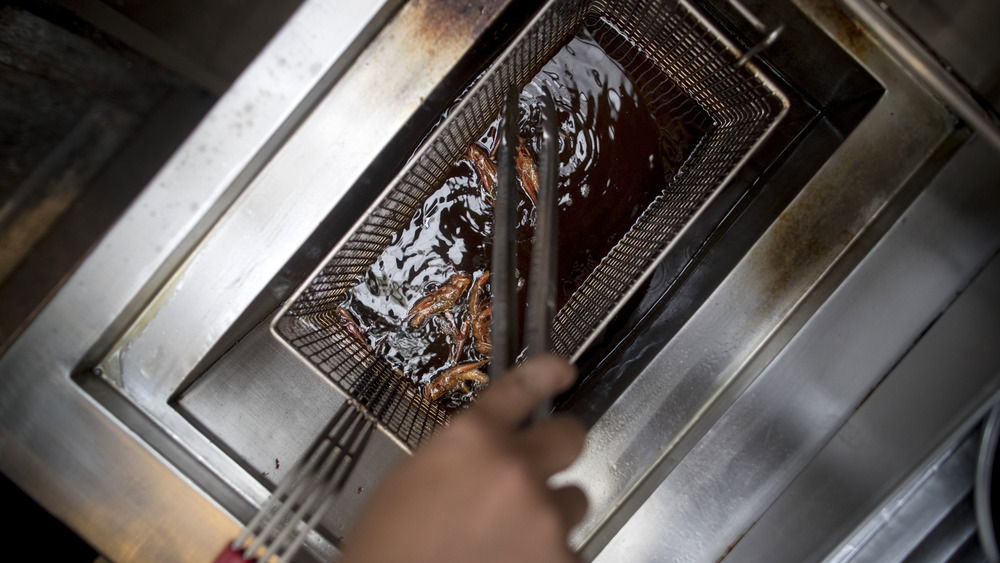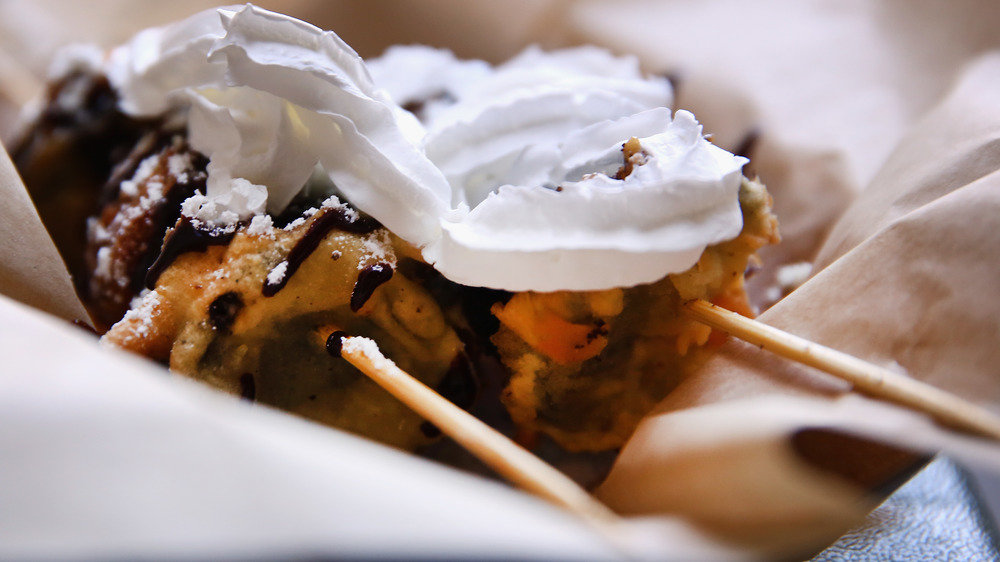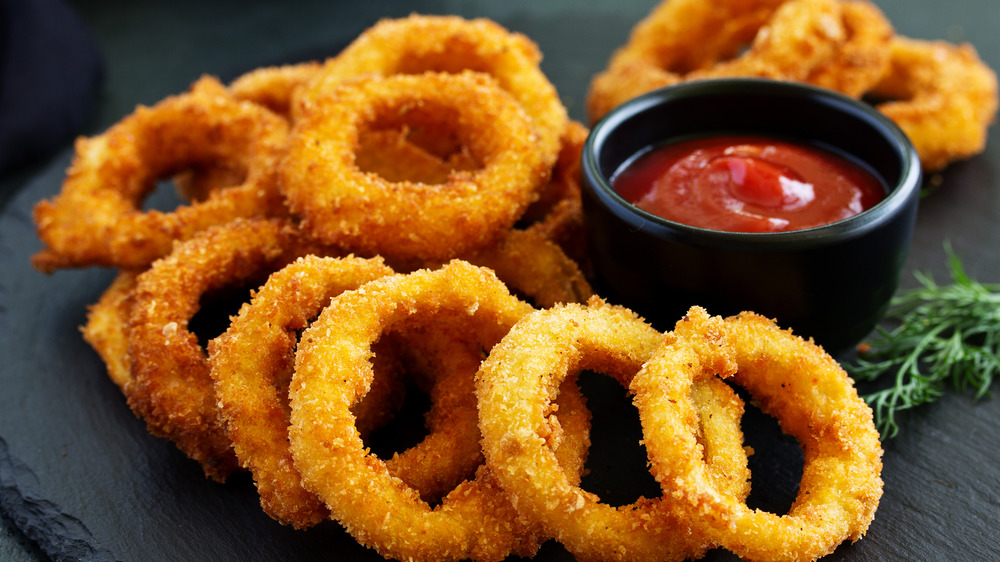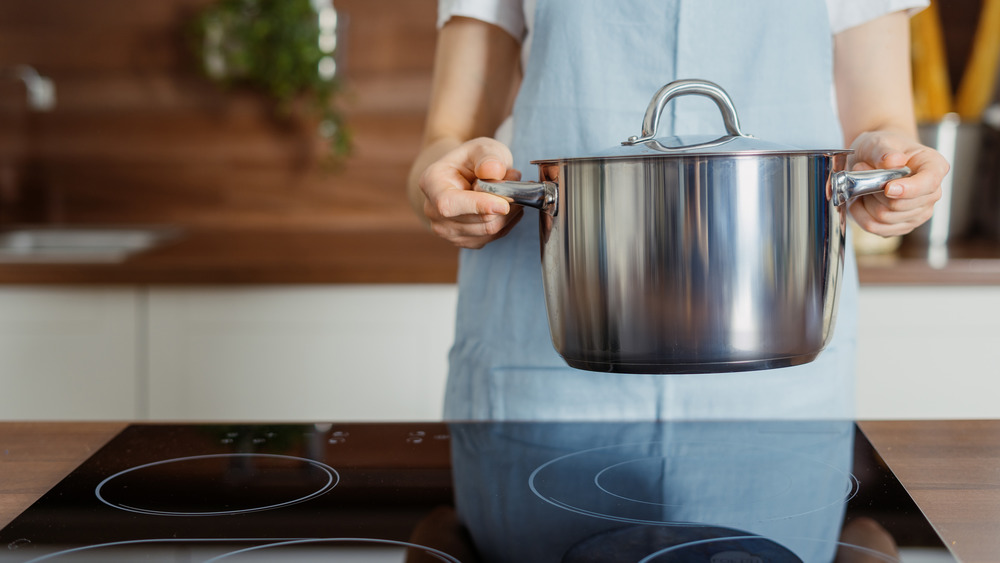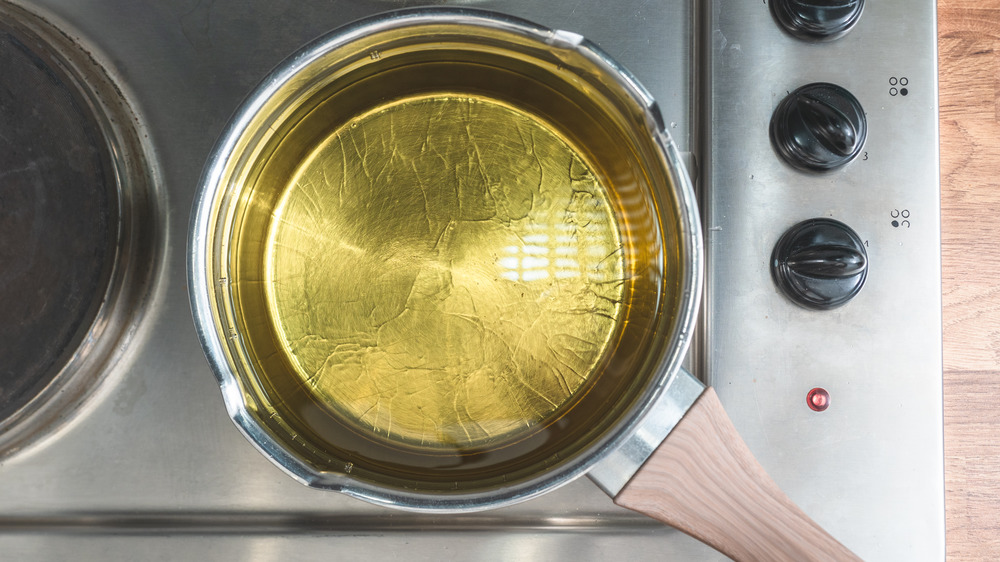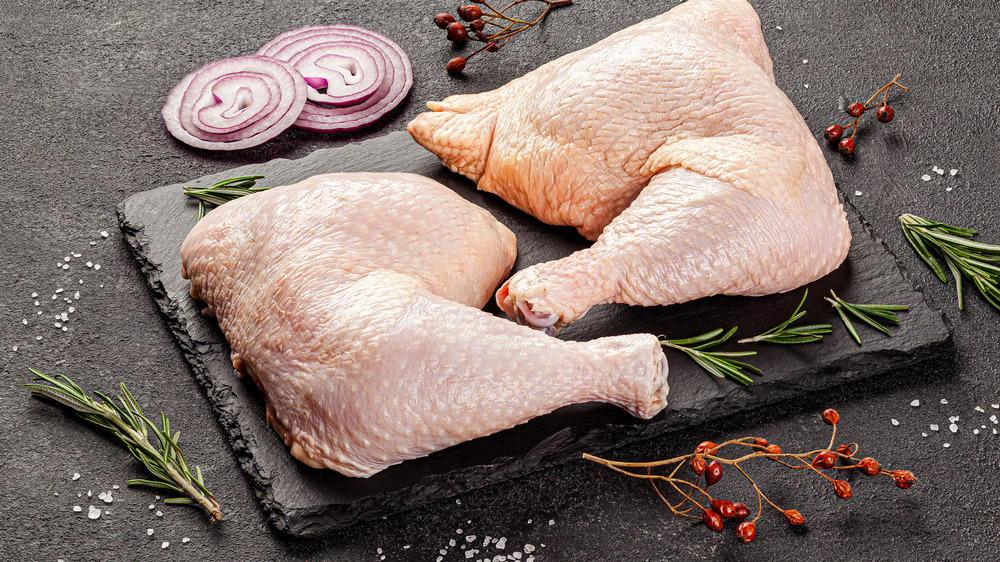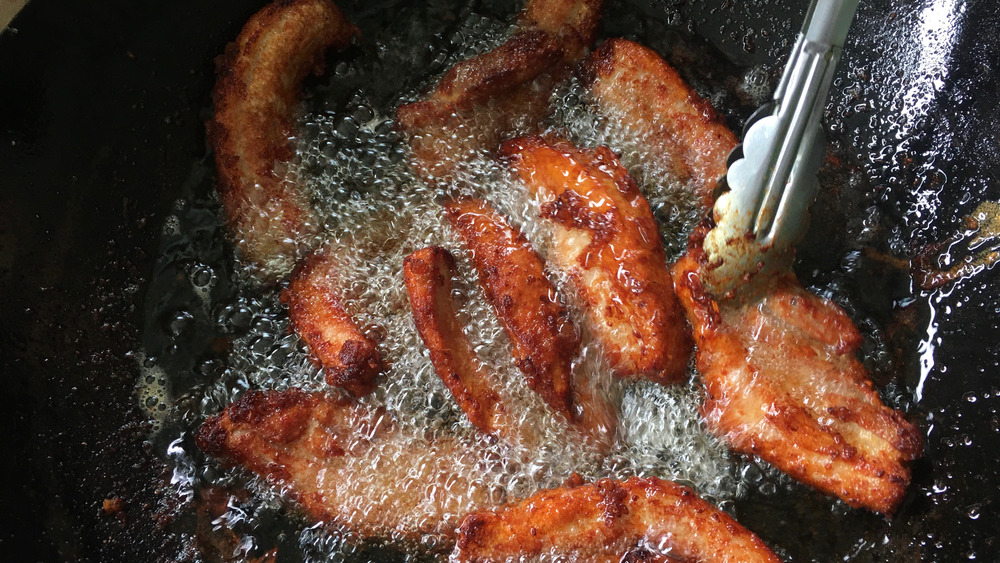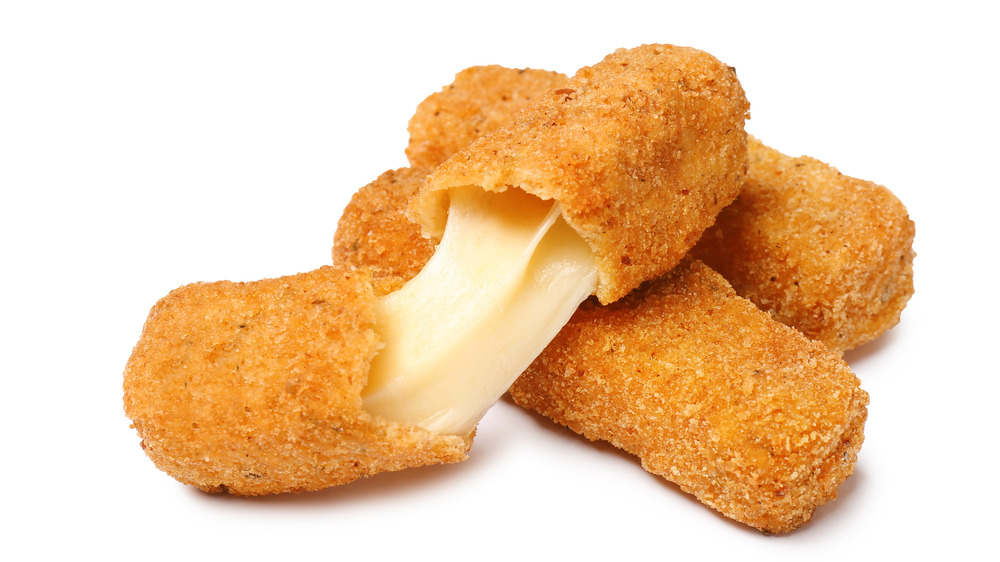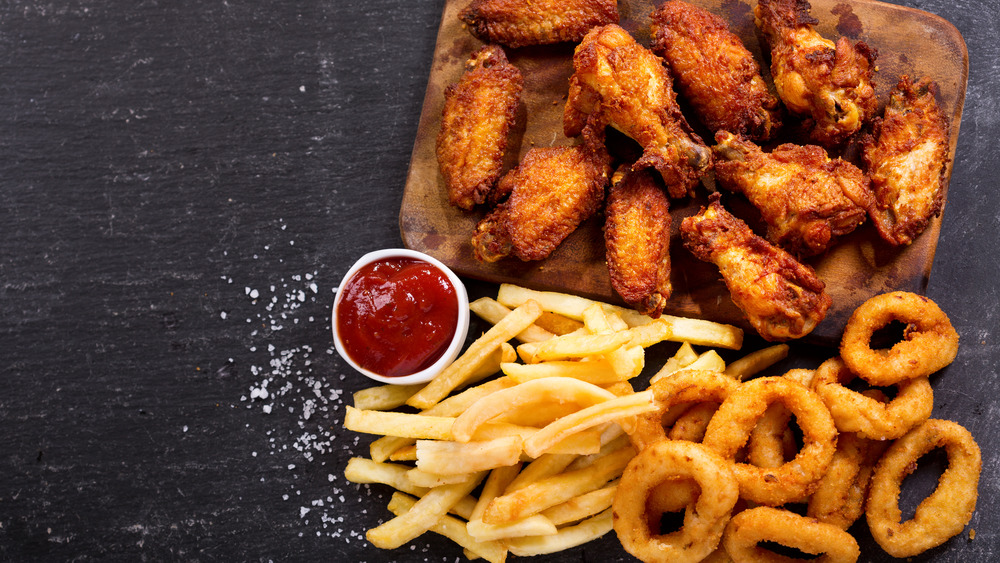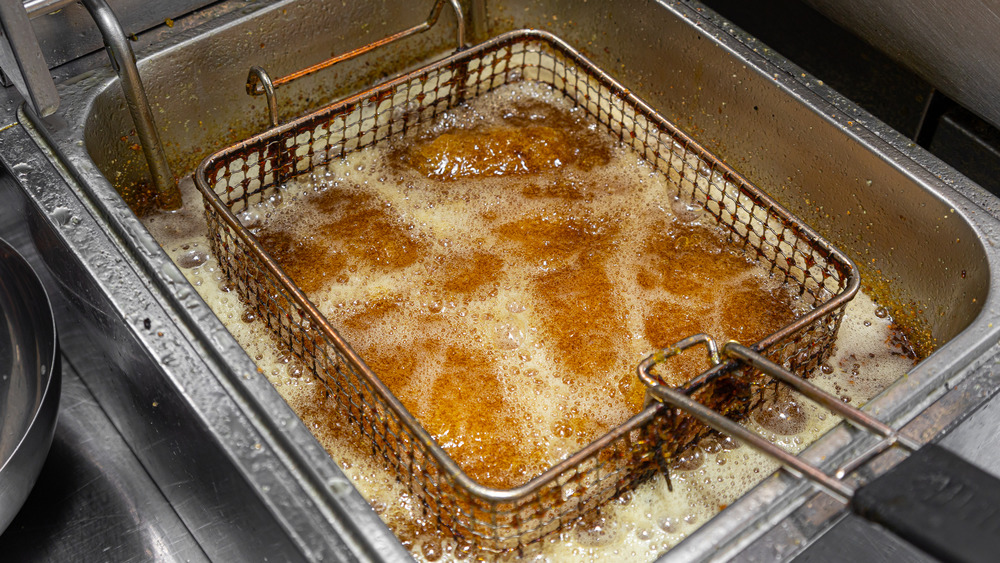The Biggest Mistakes Everyone Makes When Deep Frying
There's really nothing quite as tasty as deep-fried, well, anything. Whether it's chicken, potatoes, onions, or even ice cream or green tomatoes, deep-frying something is a sure-fire way to ensure it will taste delicious. However, deep-frying is also pretty intensive, and it requires some serious know-how before you turn that regular potato into a crispy, delicious french fry – because if you aren't careful, it could come out burnt on the outside and raw and yucky on the inside, which no one wants.
Even if you've deep-fried something before, that doesn't mean you're a pro. It takes a lot of timing, patience, and the right equipment to perfectly deep-fry something. Deep-frying also takes some practice, so don't get down on yourself if you mess up here and there. After all, there are more than a few big mistakes everyone makes when deep-frying, so if you want to avoid burning, undercooking, or just plain ruining your food, then read on.
Using the wrong oil for deep-frying
Perhaps the biggest issue people have with deep-frying foods (and other types of cooking, for that matter) is using the wrong kind of oil. After all, most people cook with olive oil, vegetable oil, or even coconut oil, and none of those are really ideal for deep-frying. When it comes to deep-frying, you have to be very particular with what oil you choose, because deep-fried food has to cook at such a high temperature, and that can actually decrease the "flavor quality of oil," according to the National Library of Medicine.
So, if you're wanting to deep-fry, choosing the right oil is a big deal, as you don't want it to start tasting bad or burn your food. That means you need an oil with a high smoke point, as well as a neutral flavor. Enter: peanut oil. Peanut oil is probably the most popular kind of oil used for deep-frying, and rightfully so. If you try to deep-fry anything with olive oil or coconut oil, you'll notice pretty quickly that it doesn't end well. And if you're worried about the flavor, OSU Extension reports that as long as the peanut oil is refined, there's a low chance it could overshadow the flavor of your food.
Deep-frying at temperatures that are too high
Along with getting the perfect oil for deep-frying foods, cooking anything in oil requires that the oil be at the right temperature. And even the most seasoned of chefs can easily mess that up when deep-frying, because it's not always easy to make sure your oil temperature is correct. However, according to Taste of Home, there is a range you should be aiming for.
Specifically, if you're making fried chicken, you want your oil to be between 325 and 390 degrees Farenheit. So, you can probably guess that things like french fries or onion rings would be on the lower end of that scale, while other meats would be similar to chicken. The issue with not cooking foods in hot enough oil is pretty obvious, as it would mean your food wouldn't cook all the way through. But when the oil is too hot, it's kind of a similar situation.
When that happens, the outside batter can get burnt too quickly, while the inside is still raw. In a word: Ew. So, to avoid that mistake, invest in a thermometer to make sure your oil is hot enough, but not too hot.
Not letting deep-fried meat get to room temperature first
When you think about deep-frying anything, you probably are mainly concerned with the actual frying process. After all, that's the most important, right? Well, not entirely. While there is still a lot to think about when you're actually deep-frying something, the preparation that goes into it is important, too. And as minute of a detail as it might seem, getting your meat to room temperature before frying it is pretty crucial to the process as a whole.
According to Bon Appetit, one of the worst things you can do while deep-frying anything, and especially when deep-frying meat, is to start breading and prepping it straight from the refrigerator. Instead, you should let the meat reach room temperature for 30 minutes before you bread and fry it. That way, it won't cool the oil down when you drop it in, and the meat will cook through and give you that perfect, crispy skin. While this is most important for meat, it's also important for vegetables in order to maintain the temperature of the oil.
Overcrowding the pan when deep-frying
Perhaps one of the cardinal rules of deep-frying anything is that you have to plan accordingly. Unlike with some other home cooking, you can't just throw some ingredients together in a pan, add some seasonings and hope for the best. You have to be precise, and one of the things you have to be precise about is just how big of a batch of something you fry at once.
According to Taste of Home, deep-frying isn't really all that different than other kinds of cooking when it comes to spacing things out. Think about something as simple as a sheet-pan meal. It's easy, sure, but even in the oven you have to make sure your ingredients aren't too close together, or else they might not cook evenly. Such is the case with deep-frying. You can't overcrowd the pan you're cooking in, or else the food won't cook properly. Instead of perfectly crispy deep-fried green beans, you'll have clumps of doughy green bean mush, and no one wants that.
Not breading properly when deep-frying
As tempting as it might be to forgo some steps while deep-frying anything, you really can't. At least not if you want the product to come out perfectly crispy and juicy. And when it comes to deep-frying something that has breading on it, the actual breading process is super important, and it's best to be stringent. In fact, you can't skimp on the breading when you deep-fry something, especially something like chicken, and there are steps you can't skip, either (via Bon Appetit).
For example, you don't just coat something in seasoning and flour once before throwing it in the oil. You dredge it in the flour mixture, then the liquid mixture, then back into the flour. And do not try to remove any extra flour after that. "That's what gives you that great, craggy crust," Bon Appetit senior food editor Dawn Perry explained. Breading something before you deep-fry it simply ensures that the dish will come out crispy and crunchy, so don't mess with the tried and true process.
Putting a lid on it after deep-frying
Unfortunately, even after you deep-fry something, there are still some mistakes you can make with the dish. No matter what you cooked up, if you aren't careful you could take away from the flavor and tenderness of deep-frying if you don't remove it from the pan and cool it properly.
After you finish deep-frying your food, and have drained or removed it from the oil, there is one thing you should never do: cover it. Seriously, putting a lid over something that was just fried and is still warm will create a super moist environment that totally destroys the integrity of the crust. On the contrary, MSN advises you to drain the deep-fried food and simply salt it afterward. And if you really want to take advantage of the delicious deep-fried meal you just cooked up, go right ahead and dig in as soon as possible.
Not watching the pan while deep-frying
For the most part, when you cook anything, you have to be somewhat aware of what's happening in the kitchen at most times. But when you bake, or bring something to a boil, or leave something to simmer for a while, you can obviously step away and go do something else. However, that is not the case for deep-frying.
The thing is you have to constantly watch the oil while deep-frying anything. Seriously, even if you just step away from your pan or pot for a few seconds, you could put your meal, your kitchen, and yourself in danger, the BBC reports. Specifically, a grease fire can start in mere seconds when the oil in the pan gets too hot or spills over. So to prevent a grease fire, and also make sure that your food doesn't burn, don't step away from the pan because it's one of the biggest mistakes you can make while deep-frying.
Risking oil burns while deep-frying
As delicious and tempting as deep-fried chicken or potatoes are, there are also some things you have to remember before you attempt to make them at home. Obviously, you need a recipe and the right ingredients and materials, but you also need the right knowledge of how to avoid some serious blunders and mistakes. When it comes to deep-frying, an oil burn injury is always a possibility (especially with larger projects, like a deep-fried turkey), and it's better to be safe than sorry.
If you notice that your oil is splattering out of the pot and coming dangerously close to hitting you, then that might mean whatever you're frying isn't dry and the liquid is causing the oil to fly out, Bon Appetit advises. In order to avoid that, and any kind of oil burn, you need to put your food into the oil slowly, carefully, and purposefully with either a pair of tongs or just your hands and drop it facing away from you. It might sound scary to get that close to hot oil, but it will actually decrease the odds of it splashing in your face, so be safe.
Not brining the meat before deep-frying
As any cook knows, it's important to properly season anything that you cook, no matter how you're cooking it. But with deep-frying foods, the proper protocol goes beyond simply seasoning it to perfection — you also need to marinade it in order to get the right texture.
When it comes to making the perfect fried chicken, brining or marinading it is seriously key. Soaking the meat in some kind of acidic liquid will yield the best fried chicken. A nice, long soak in an acidic mixture, such as buttermilk, can be the difference between a lackluster, dry texture and moist, juicy chicken.
And, according to Bon Appetit, it's a huge mistake not to brine or marinade any kind of meat you want to deep-fry. Specifically, with something like fried chicken, you should soak the raw chicken in a seasoned buttermilk mixture for at least a few hours before you cook it up. That will ensure your meat is tender, juicy, and oh-so-flavorful. Sure, you could skip the entire process, but you'll regret it, and it could end up being a huge mistake.
Recycling oil after deep-frying
After you've deep-fried chicken or vegetables or heck, even Oreos, you might assume that as long as things haven't broken apart too much, you can reuse your frying oil in the future. However, just because you didn't get too messy with your last deep-fried project doesn't mean you can reuse the same oil over and over again. In fact, it's actually dangerous to recycle oil when deep-frying (via Taste of Home).
Specifically, if you continue to use the same oil for too many batches, your finished product will be way too greasy, could burn easier, and taste "off" once you actually eat it. Finally, when you recycle oil too much you will lower the "flash point" according to Taste of Home, and that potentially raises the risk for a grease fire. So, instead, properly dispose of your cooking oil regularly while you're deep-frying and you'll be a lot better off.
Letting deep-fried food cool in this all-too-common way
While there are a lot of things not to do when deep-frying food, another super important tip to remember is that the way you let your deep-fried food cool off can also majorly impact how good it is. As tempting as it might be, if you let your deep-fried meal cool by placing it on this one simple household item after you're done cooking, you'll regret it. So, what exactly should you never cool fried food on?
"Letting anything that's been fried sit on paper towel will make it soggy, because it'll start to steam," Bon Apetit senior food editor Dawn Perry explained. Instead, Perry advises cooks to instead cool any fried foods on a wire rack placed over a baking sheet. That way, the extra grease will drip off, you can bring the food down to a temperature safe to eat without burning your mouth, and it will stay crispy and yummy.
Oversalting deep-fried food
If you've ever cooked, then you know exactly how important it is to use enough salt and pepper to bring out the flavor of whatever it is you're whipping up. However, when you deep-fry something, you have to be pretty careful about over-salting whatever you're cooking. Sure, you want it to be flavorful, but the way in which you salt foods before deep-frying them is pretty important.
In fact, it might be a huge mistake to salt your food before you bread it to deep-fry it, MSN reports. That's because salt placed directly on food removes the water that's naturally in it, and when you deep-fry something afterwards, the breading could be wet, and the oil with fly out everywhere. So, while it's important to season your food before you deep-fry it, there are better ways to go about that. For instance, you could season your breading mixture and then salt your food right after it's done frying to ensure it has plenty of flavor without sacrificing on texture.
Using dangerous amounts of oil when deep-frying
The most important and crucial part of deep-frying anything is obviously the oil. After all, something can't be fried if it's not cooked in boiling-hot, fatty, delicious oil. But as important as the oil is when you're deep-frying, you shouldn't use too much of it, as that can be dangerous.
When you deep-fry something, it sends up little bubbles of steam to the surface of the pot of oil, and that's totally fine. Unless, that is, you've put too much oil in your pot, because then the little bubbles could turn into a huge problem by rising up and spilling over the sides of the pot or pan you're cooking in, leading to a big mess at best and a grease fire or burn at worse, Bon Appetit reports. To avoid that disaster, Bon Appetit suggests you fill your pot only two-thirds of the way full with oil.
